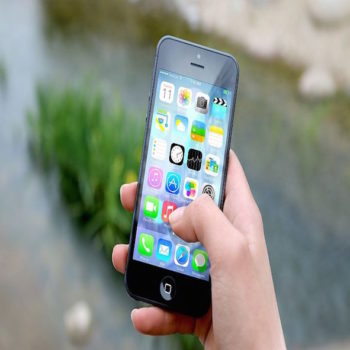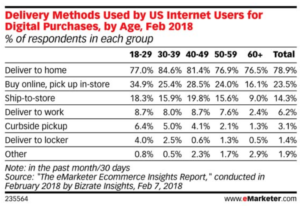Shopping Apps Help Mobile Account for Half of European Online Sales; Nearly Half of UK Shoppers Put Off by Irrelevant Offers
by Hugh Williams on 1st Mar 2018 in News

RetailTechNews’ weekly roundup brings you up-to-date research findings from around the world. In this week’s edition: Shopping Apps Help Mobile Account for Half of European Online Sales; Nearly Half of UK Shoppers Put Off by Irrelevant Offers; and For Most Online Shoppers, Home Delivery Is Still the Default Option
Shopping Apps Help Mobile to Account for Half of Online Sales in Europe
Mobile apps are continuing to drive up the popularity of mobile purchases, according to the Q4 Global Commerce Report by Criteo. The findings show that retailers that operate a shopping app see 50% of online sales take place on mobile.

The report also revealed that the UK is well ahead of the European average in terms of mobile shopping – even when apps are excluded, mobile devices account for 53% of online transactions in the UK, as opposed to 40% in Europe as a whole.
With the report also revealing that mobile apps have a conversion rate 3x higher than that of mobile web, the world of mobile shopping has clearly evolved beyond just web browsing. European retailers that operate a shopping app see 54% of sales take place in-app as opposed to on mobile web.
It is also interesting to note that 24% of post-click desktop transactions were preceded by a click on a different device in the UK. Fashion, luxury, health, and beauty have seen the most dramatic rise in UK mobile sales year-on-year (56%), while home (48%) and sporting goods (32%) lag behind.
Nearly Half of UK Shoppers Put Off by Irrelevant Offers
Nearly a half (44%) of UK shoppers shy away from brands that don’t offer them personalised, relevant offers, according to new research conducted by Ecrebo.

In today’s competitive retail landscape, retailers must be offering their customers personalised, relevant offers. Overall, loyalty continues to play an important role in purchasing behaviour, with 85% of shoppers saying they are more likely to shop with a brand if it offers a loyalty scheme.
In addition, 68% said they expected to be offered promotions based on their past purchases. The research also uncovered that coupons play a significant role in purchasing. Just over three-quarters (76%) of shoppers said coupons change their shopping behaviour and 40% now expect a coupon when they shop. A further 32% said they sometimes wouldn’t make a purchase at all without a coupon.
For Most Online Shoppers, Home Delivery Is Still the Default Option
Millennials are more likely to try more nontraditional delivery methods for their digital purchases, according to research by Bizrate Insights. These could include getting something delivered to a locker.

While very few total respondents (1.4%) said they get their digital purchases delivered to a locker – possibly because they have to go somewhere else to pick up their package, as opposed to just having it shipped to their home or job – millennials (4%) were more likely to say they use this method than older respondents. Less than 1% of respondents ages 40 to 49 and those 60 and older said they use it.
By comparison, the majority of U.S. adult internet users prefer getting their digital orders delivered to their homes. By and large, respondents – regardless of age – were fans of home delivery. Fully 78.9% of those surveyed said they used that particular method for digital purchases.
But that shouldn't be very surprising. Millennials, who grew up with technology and Amazon as a given, are more likely to try and trust alternative delivery methods. And their on-the-go lives lead to higher adoption of curbside pickup, which is a relatively new concept for older shoppers.This content was originally published in RetailTechNews.
DataE-CommerceM-CommerceMobileTechnology








Follow ExchangeWire